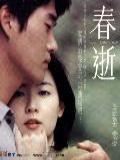
One Fine Spring Day
Rating: 7/10
Year: 2001
Genre: Love
Director: Hur Jin-Ho
Cast: Yu Ji-Tae, Lee Young-Ae
Hur Jin-Ho built up his reputation rapidly from his previous work Christmas in August, a modern masterpiece of Korean cinema. One Fine Spring Day is his second feature attempt. Unfortunately, because of his banal subject matter, it is generally not welcome by the public.
The film has a commonplace plot. Sang-Wo (Yu Ji-Tae), a sound recorder, meet with a local DJ Eun-Soo (Lee Young-Ae) on a trip. They soon fall in love and have a wonderful time together. But Sang-Woo's passion reminds Eun-Soo of her tragic past, that she decides to break up with him eventually. Sang-Woo still loves her and cannot forget her...
If you are a fan of Christmas in August, you might be disappointed with this film. Obviously, the story of this film is not as touching as Christmas in August. According to the general comments I got from this film, it is even said to be a boring work. But is that all? Certainly not. I have to admit that the banality of the subject matter might keep potential audience away, yet, to me, what is most invaluable and unforgettable about this film is not the story, but the style of the director Hur Jin-Ho, especially the cinematography.
The cinematography of this film is spectacular. Almost the entire film is composed of long takes and long shots. For those who are not familiar with cinematic terms, long take refers to a shot of long duration, while long shot is the type of shot that frames the entire human figure or at least the human body from knees up. If you rewatch the films several times, you will realize that throughout the films, there is barely any shots that allows you to see clearly the faces of the actors. There is absolutely no close-up at all. What is good about this kind of cinematography is the effect of off-center framing produced. Japanese filmmaker Yasujiro Ozu was a master of this cinematic style. By off-center framing, what I mean is that the focus of the camera is not the characters on the screen (as opposed to the actor-dominated camera work of classical Hollywood narrative), the camera usually is positioned in a way so that our eyes are thrown out upon the world beyond the frame, it aims at suggesting the essential reality of the world. It is mainly done by shooting from a long and fixed shot, the camera might hold still for a moment even when there is no action actually taken place on the frame. It is said that the longer the screen remains motionless, the more our attention is drawn to the diegesis of the film. In One Fine Spring Day, Hur Jin Ho composes a lot of his shots in this way. In most of the shots, for instance, the empty bedroom, the train station, there is no camera movement or editing at all. A strong sense of reality is created. It matches the banal subject matter of the story and reinforces its realistic feeling.
The depiction of the characters is authentic. It is not a melodrama. Over-dramatic twist is unnecessary. The moderate and unruffled relationship of Sang-Woo and Eun-Soo allows us to commiserate with the characters in an intimate way. We can feel for the characters because their relationship is so real and close to us, what happened to Sang-Woo and Eun-Soo can happen to any of us as well!
I strongly recommend One Fine Spring Day to anyone who loves innovative and exquisite cinematography. However, it is not a highly commerical flick. If you are looking for something to laugh at or cry, it is probably not your cup of tea.
VCD (HK version) - Why did I buy the VCD instead of the DVD? I have no idea. I guess I probably have to order the DVD now...
Reviewed by: Kantorates